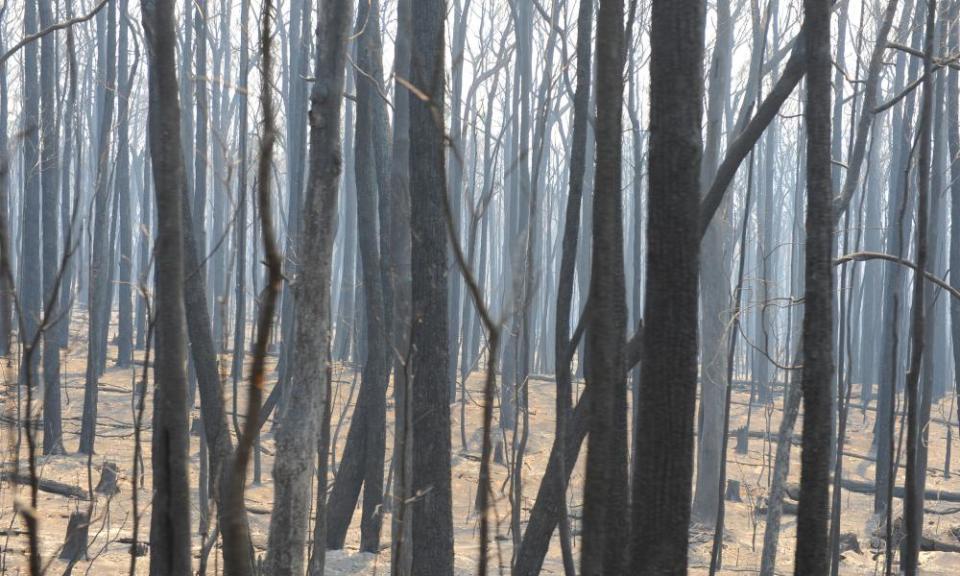Logging Victoria's burnt forest would hurt 30 threatened species, study says

A proposal by Victoria’s state-owned forestry agency to log forest burnt in the summer bushfires would affect habitat for more than 30 threatened species, according to analysis by The Wilderness Society.
VicForests has proposed opening 59 new coupes in the state’s north-east and East Gippsland regions for so-called salvage logging of burnt native forests.
Conservationists have opposed the plan and in a submission to public consultation on the proposal, The Wilderness Society (TWS) says its analysis found each of the 59 coupes contained habitat for threatened species, with 39 containing habitat for critically endangered species.
The environment group is also urging companies that purchase VicForests timber to reject any logs from the new coupes, warning timber millers may be “subject to legal exposure” if harvesting of timber breached environmental laws.
Related: Bunnings stops selling timber logged by VicForests after court ruling
Under Australia’s Illegal Logging Prohibition Act, companies are not permitted to process timber that has been illegally logged.
“The Wilderness Society generally does not believe that any VicForests harvested logs can be said to be ‘low risk’,” the organisation said in its letter, which was also submitted to VicForests.
“However, as logs from these coupes will have a very clear and specific set of risks, based upon threatened species analysis and the recent federal court ruling, the risk of illegality for logs from these areas is potentially even higher.”
Amelia Young, the national campaigns director for TWS, said the analysis found the proposed logging in the 59 coupes could affect habitat for 34 species, including the regent honeyeater, the spotted-tail quoll and the greater glider.
The organisation used the federal government’s threatened species database and maps of the timber release plan to reach its conclusions.
Related: Calls for review of forestry exemption laws after VicForests conservation breaches
It argues that companies receiving VicForests timber should be applying greater scrutiny to the agency’s operations following a recent federal court judgment that found VicForests breached laws protecting threatened species.
“What we have here is VicForests proposing to add a number of coupes to the timber release plan which the analysis shows is very likely to be habitat for animals like the greater glider and also heavily impacted by last summer’s bushfires,” Young said.
“We hope that the mills, the processors of VicForest logs, more carefully scrutinise the wood being supplied to them and, as they’re legally required to, conduct due diligence.”
The May federal court ruling found VicForests had breached the code of conduct in the regional forestry agreement for logging operations in Victoria’s central highlands.
As a result of this, the court ruled the operations were not exempt from national environmental laws and that past and proposed logging would have a significant impact on the vulnerable greater glider and the critically endangered Leadbeater’s possum.
Final orders have not yet been issued in the case and VicForests has said it plans to appeal.
Earlier this month, Bunnings announced it would stop selling timber supplied by VicForests, in response to the federal court case.
A spokesman for VicForests said the proposed 59 new coupes were “selected based on rigorous field and desk-based surveys”.
“Any area confirmed for harvesting will be surveyed for endangered species prior to harvesting and areas within the coupes will be off-limits where they are found,” he said.
He said the timber release plan was required to ensure “there is the necessary timber to keep supply chain businesses and hundreds of people in work”.
The Victorian government announced a plan last year to phase out native forest logging by 2030.
On Wednesday, the government said it would provide $4m to Forest and Wood Products Australia over four years for the establishment of a Gippsland centre of the National Institute for Forest Products Innovation.
The centre is being established to help diversify the forestry sector as it transitions from native timber harvesting to plantation timber.

